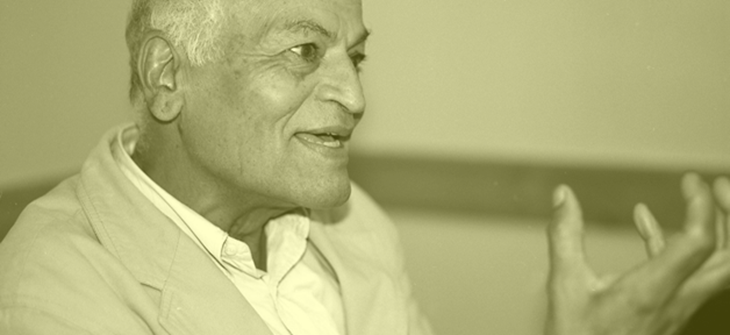Published 22/05/2013

Satish Kumar, editor-in-chief of Resurgence & Ecologist magazine, guest blogs for us today, outlining his vision for better food and farming.
We live in the world of TV dinners, junk food and ready meals. This is the world of mass produced, highly packaged and thoroughly commercialised food systems. This is the world where the knowledge and skills of growing are undermined, where the art of cooking is weakened and where the delights of dining together with friends and family is diminished. We have lost control on the sources of food. Most of us have no say in how food is grown, how it is distributed, how it is priced or even how it is cooked.
Access to food should be a fundamental human right; food is nature’s gift to all. Feeding people and all living creatures is intrinsic to life and to existence. But sadly food has become a commercial commodity and is no longer available to everyone equally. The primary objective of those who deal in the business of food is to make money and feeding people has become secondary. No wonder that we face multiple crises such as rising costs of food, an obesity epidemic, malnutrition and world hunger.
An urgent challenge facing the world is to look at the first principal of food systems, which is to sustain life. The primary responsibility of governments and business leaders is to develop policies and practices which can meet the food needs of all people around the world, while at the same time, protecting the integrity and sustainability of the Earth itself.

Growing, cooking and eating good food is an ecological activity. Food is more than just fuel for the body, food is a source of spiritual, social, cultural and physical nourishment.
People ask, "What can we do to combat global warming, environmental degradation, social injustice, break down of families and communities?". Where do we start to address these big issues? The answer is simple: Let us start with food, let us eat local, organic, seasonal and delicious food; let us take control of food into our own hands, rather than leaving it in the hands of the big producers and distributors.
The intimate action of eating the right food and good food is a solution to the ultimate problems of global warming and global hunger. Food is a microcosm of the macrocosm. When we focus on food we immediately pay attention to the multinational corporations who turn food into a commodity; to genetic engineering of seeds where crop control and agricultural decisions pass from peasants and farmers to managers and engineers. If we are concerned about industrial farming, factory farming agri-business, food miles, soil erosion, cruelty to animals, fast foods, fatty foods and non-foods then we have to start with a look at our plate and what is on it. The food in our kitchen is ultimately connected to global warming and global poverty, as well as our health.
Our focus on food will lead to land reform, self-sufficiency, farmers’ markets, allotment gardens, slow food, artisan food, permaculture, agro-forestry and much more. As Mahatma Gandhi said: "You must be the change you wish to see in the world". We have to transform our personal relationship with food; that is the first step towards transforming political, economic and social policies on food. Personal and political are two sides of the same coin; we cannot do one without the other. We start with the personal and stride toward the political. Then there is integrity in what we say and what we do. Of course we cannot stop at just personal lifestyle change, we need to communicate, organise and build a popular movement to put pressure on governments and businesses to change their ways. But if we practice what we preach then there is an integrity between our words and our actions.
Are we prepared to put our hands in the soil? Have we time to bake bread and share our meals together? If we have no time to cook and eat properly, then we have no time to live. As Moliere said: "It is food not fine words that keeps me alive".
By focusing on food, we connect the personal with the political and the intimate with the ultimate.
Satish Kumar is editor-in-chief of Resurgence & Ecologist.
